Deck 18: Structure Determination 2: Nuclear Magnetic Resonance Spectroscopy and Mass Spectrometry
Question
Question
Question
Question
Question
Question
Question
Question
Question
Question
Question
Question
Question
Question
Question
Question
Question
Question
Question
Question
Question
Question
Question
Question
Question
Question
Question
Question
Question
Question
Question
Question
Question
Question
Question
Question
Question
Question
Question
Question
Question
Question
Question
Question
Question
Question
Question
Question
Question
Question
Question
Question
Question
Question
Question
Question
Question
Question
Question
Question

Unlock Deck
Sign up to unlock the cards in this deck!
Unlock Deck
Unlock Deck
1/60
Play
Full screen (f)
Deck 18: Structure Determination 2: Nuclear Magnetic Resonance Spectroscopy and Mass Spectrometry
1
How many distinct signals are in the 13C NMR of the following compound? 
A)Four
B)Five
C)Six
D)Seven
E)Eight

A)Four
B)Five
C)Six
D)Seven
E)Eight
Six
2
Which will produce the largest coupling constant? 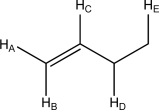
A)HA coupling to HB
B)HA coupling to HC
C)HB coupling to HC
D)HC coupling to HD
E)HD coupling to HE

A)HA coupling to HB
B)HA coupling to HC
C)HB coupling to HC
D)HC coupling to HD
E)HD coupling to HE
HB coupling to HC
3
Which hydrogen type has the smallest integration value? 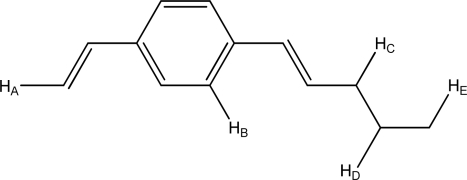
A)HA
B)HB
C)HC
D)HD
E)HE

A)HA
B)HB
C)HC
D)HD
E)HE
HA
4
How many chemically distinct hydrogen atoms are in the following molecule? 
A)Two types
B)Three types
C)Four types
D)Five types
E)Six types

A)Two types
B)Three types
C)Four types
D)Five types
E)Six types

Unlock Deck
Unlock for access to all 60 flashcards in this deck.
Unlock Deck
k this deck
5
What apparent splitting pattern would not be found in the 1H NMR spectrum or the following molecule? 
A)Singlet
B)Doublet
C)Triplet
D)Quartet
E)Quintet

A)Singlet
B)Doublet
C)Triplet
D)Quartet
E)Quintet

Unlock Deck
Unlock for access to all 60 flashcards in this deck.
Unlock Deck
k this deck
6
Which molecule has a triplet of doublets in its 1H NMR spectrum? 
A)I
B)II
C)III
D)IV
E)V

A)I
B)II
C)III
D)IV
E)V

Unlock Deck
Unlock for access to all 60 flashcards in this deck.
Unlock Deck
k this deck
7
HA splits the 1H NMR signal for HB by 7.4 Hz.By how much does HB split the 1H NMR signal for HA? 
A)0 Hz
B)3.7 Hz
C)7.4 Hz
D)14.8 Hz
E)Not enough information to answer

A)0 Hz
B)3.7 Hz
C)7.4 Hz
D)14.8 Hz
E)Not enough information to answer

Unlock Deck
Unlock for access to all 60 flashcards in this deck.
Unlock Deck
k this deck
8
Which compound has four distinct signals in its 13C NMR spectrum? 
A)I
B)II
C)III
D)IV
E)V

A)I
B)II
C)III
D)IV
E)V

Unlock Deck
Unlock for access to all 60 flashcards in this deck.
Unlock Deck
k this deck
9
How many chemically distinct hydrogen atoms are in the following molecule? 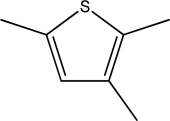
A)Two types
B)Three types
C)Four types
D)Five types
E)Six types

A)Two types
B)Three types
C)Four types
D)Five types
E)Six types

Unlock Deck
Unlock for access to all 60 flashcards in this deck.
Unlock Deck
k this deck
10
Which hydrogen type has the greatest integration value? 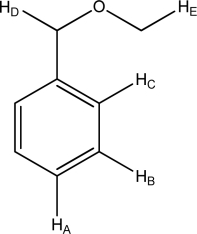
A)HA
B)HB
C)HC
D)HD
E)HE

A)HA
B)HB
C)HC
D)HD
E)HE

Unlock Deck
Unlock for access to all 60 flashcards in this deck.
Unlock Deck
k this deck
11
Which molecule does not have a doublet of doublets in its 1H NMR spectrum? 
A)I
B)II
C)III
D)IV
E)V

A)I
B)II
C)III
D)IV
E)V

Unlock Deck
Unlock for access to all 60 flashcards in this deck.
Unlock Deck
k this deck
12
What is the expected splitting pattern for the indicated hydrogen? 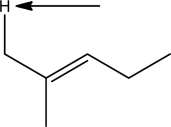
A)Singlet
B)Doublet
C)Triplet
D)Quartet
E)Quintet

A)Singlet
B)Doublet
C)Triplet
D)Quartet
E)Quintet

Unlock Deck
Unlock for access to all 60 flashcards in this deck.
Unlock Deck
k this deck
13
Which molecule will have the greatest coupling constant between HA and HB? 
A)I
B)II
C)III
D)IV
E)V

A)I
B)II
C)III
D)IV
E)V

Unlock Deck
Unlock for access to all 60 flashcards in this deck.
Unlock Deck
k this deck
14
Which hydrogen atom has the greatest chemical shift? 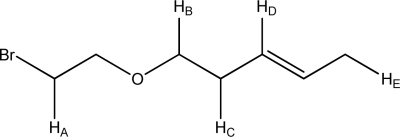
A)HA
B)HB
C)HC
D)HD
E)HE

A)HA
B)HB
C)HC
D)HD
E)HE

Unlock Deck
Unlock for access to all 60 flashcards in this deck.
Unlock Deck
k this deck
15
What is the expected splitting pattern for the indicated hydrogen? 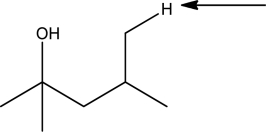
A)Singlet
B)Doublet
C)Triplet
D)Quartet
E)Quintet

A)Singlet
B)Doublet
C)Triplet
D)Quartet
E)Quintet

Unlock Deck
Unlock for access to all 60 flashcards in this deck.
Unlock Deck
k this deck
16
Which of the following molecules would have a quartet at 3.5 ppm? 
A)I
B)II
C)III
D)IV
E)V

A)I
B)II
C)III
D)IV
E)V

Unlock Deck
Unlock for access to all 60 flashcards in this deck.
Unlock Deck
k this deck
17
Which hydrogen atom has the greatest chemical shift? 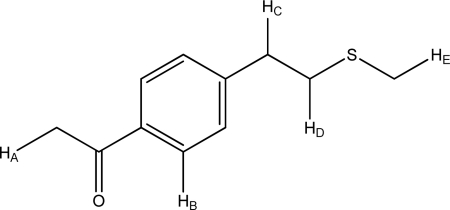
A)HA
B)HB
C)HC
D)HD
E)HE

A)HA
B)HB
C)HC
D)HD
E)HE

Unlock Deck
Unlock for access to all 60 flashcards in this deck.
Unlock Deck
k this deck
18
What is the relative ratio of hydrogens in the following molecule? 
A)3:3:1:2:2:2:1:3:3
B)6:1:2:1
C)6:1:2:2:2:1:6
D)12:2:2:2:2
E)None (a-d) give the correct relative ratio of hydrogens.

A)3:3:1:2:2:2:1:3:3
B)6:1:2:1
C)6:1:2:2:2:1:6
D)12:2:2:2:2
E)None (a-d) give the correct relative ratio of hydrogens.

Unlock Deck
Unlock for access to all 60 flashcards in this deck.
Unlock Deck
k this deck
19
Which of the following molecules would have a singlet at 2.1 ppm? 
A)I
B)II
C)III
D)IV
E)V

A)I
B)II
C)III
D)IV
E)V

Unlock Deck
Unlock for access to all 60 flashcards in this deck.
Unlock Deck
k this deck
20
How many chemically distinct hydrogen atoms are in the following molecule? 
A)Four types
B)Five types
C)Six types
D)Seven types
E)Eight types

A)Four types
B)Five types
C)Six types
D)Seven types
E)Eight types

Unlock Deck
Unlock for access to all 60 flashcards in this deck.
Unlock Deck
k this deck
21
Which compound would produce the 1H NMR spectrum below? 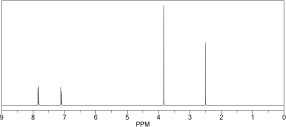

A)I
B)II
C)III
D)IV
E)V


A)I
B)II
C)III
D)IV
E)V

Unlock Deck
Unlock for access to all 60 flashcards in this deck.
Unlock Deck
k this deck
22
Which compound would produce the 1H NMR spectrum below? 
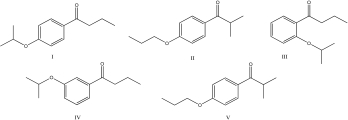
A)I
B)II
C)III
D)IV
E)V


A)I
B)II
C)III
D)IV
E)V

Unlock Deck
Unlock for access to all 60 flashcards in this deck.
Unlock Deck
k this deck
23
Which proton in the following molecule has the greatest chemical shift? 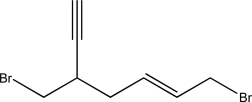


Unlock Deck
Unlock for access to all 60 flashcards in this deck.
Unlock Deck
k this deck
24
Which proton in the following molecule has the greatest chemical shift? 


Unlock Deck
Unlock for access to all 60 flashcards in this deck.
Unlock Deck
k this deck
25
Which type of atom is likely present in the molecule responsible for the following mass spectrum? 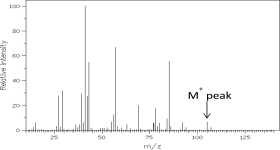
A)N
B)F
C)Cl
D)Br
E)I

A)N
B)F
C)Cl
D)Br
E)I

Unlock Deck
Unlock for access to all 60 flashcards in this deck.
Unlock Deck
k this deck
26
What is the expected splitting pattern for the indicated hydrogen? 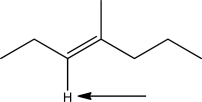


Unlock Deck
Unlock for access to all 60 flashcards in this deck.
Unlock Deck
k this deck
27
Which hydrogen in the following molecule has the greatest integration value? 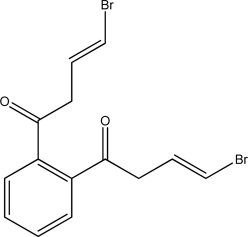


Unlock Deck
Unlock for access to all 60 flashcards in this deck.
Unlock Deck
k this deck
28
The mass spectrum for an unknown molecule has an M peak with a relative intensity of 50 and an M 1 peak with a relative intensity of 1.65.How many carbons are in the unknown molecule?
A)One carbon
B)Two carbons
C)Three carbons
D)Four carbons
E)Six carbons
A)One carbon
B)Two carbons
C)Three carbons
D)Four carbons
E)Six carbons

Unlock Deck
Unlock for access to all 60 flashcards in this deck.
Unlock Deck
k this deck
29
Which proton in the following molecule has the greatest chemical shift? 


Unlock Deck
Unlock for access to all 60 flashcards in this deck.
Unlock Deck
k this deck
30
Which compound would produce the 1H NMR spectrum below? 

A)I
B)II
C)III
D)IV
E)V


A)I
B)II
C)III
D)IV
E)V

Unlock Deck
Unlock for access to all 60 flashcards in this deck.
Unlock Deck
k this deck
31
The mass spectrum for an unknown molecule has an M+ peak with a relative intensity of 100 and an M + 1 peak with a relative intensity of 9.905.How many carbons are in the unknown molecule?
A)1 carbon
B)5 carbons
C)9 carbons
D)10 carbons
E)100 carbons
A)1 carbon
B)5 carbons
C)9 carbons
D)10 carbons
E)100 carbons

Unlock Deck
Unlock for access to all 60 flashcards in this deck.
Unlock Deck
k this deck
32
Which of the following is the base peak? 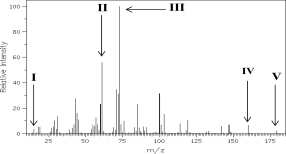
A)I
B)II
C)III
D)IV
E)V

A)I
B)II
C)III
D)IV
E)V

Unlock Deck
Unlock for access to all 60 flashcards in this deck.
Unlock Deck
k this deck
33
Which compound would produce the given 1H NMR spectrum below? 

A)I
B)II
C)III
D)IV
E)V


A)I
B)II
C)III
D)IV
E)V

Unlock Deck
Unlock for access to all 60 flashcards in this deck.
Unlock Deck
k this deck
34
Which compound would produce the 1H NMR spectrum below? 

A)I
B)II
C)III
D)IV
E)V


A)I
B)II
C)III
D)IV
E)V

Unlock Deck
Unlock for access to all 60 flashcards in this deck.
Unlock Deck
k this deck
35
How many chemically distinct hydrogen atoms are in the following molecule? 


Unlock Deck
Unlock for access to all 60 flashcards in this deck.
Unlock Deck
k this deck
36
Which m/z value would indicate that nitrogen was present in a sample?
A)m / z 13
B)m / z 100
C)m / z 104
D)m / z 150
E)m / z 155
A)m / z 13
B)m / z 100
C)m / z 104
D)m / z 150
E)m / z 155

Unlock Deck
Unlock for access to all 60 flashcards in this deck.
Unlock Deck
k this deck
37
Which hydrogen in the following molecule has the greatest integration value? 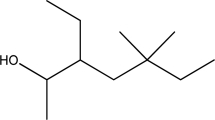


Unlock Deck
Unlock for access to all 60 flashcards in this deck.
Unlock Deck
k this deck
38
Give the expected splitting patterns for HA,HB,HC,and HD. 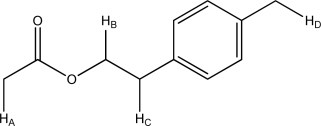


Unlock Deck
Unlock for access to all 60 flashcards in this deck.
Unlock Deck
k this deck
39
Give the expected splitting pattern for the indicated hydrogen. 


Unlock Deck
Unlock for access to all 60 flashcards in this deck.
Unlock Deck
k this deck
40
How many chemically distinct hydrogen atoms are in the following molecule? 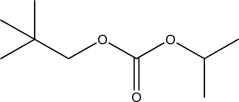


Unlock Deck
Unlock for access to all 60 flashcards in this deck.
Unlock Deck
k this deck
41
How many distinct 13C NMR signals are expected for the following compound? 


Unlock Deck
Unlock for access to all 60 flashcards in this deck.
Unlock Deck
k this deck
42
Explain how you can use a mass spectrum to determine if a single chlorine is present in a molecule.

Unlock Deck
Unlock for access to all 60 flashcards in this deck.
Unlock Deck
k this deck
43
Explain how the two following isomers can be distinguished using 1H NMR without using a standard for comparison. 


Unlock Deck
Unlock for access to all 60 flashcards in this deck.
Unlock Deck
k this deck
44
For the following molecule,give the splitting patterns for HA,HB,and HC. 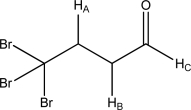


Unlock Deck
Unlock for access to all 60 flashcards in this deck.
Unlock Deck
k this deck
45
The mass spectrum for an unknown molecule has an M+ peak with a relative intensity of 12.5 and an M + 1 peak with a relative intensity of 2.48.How many carbons are in the unknown molecule?

Unlock Deck
Unlock for access to all 60 flashcards in this deck.
Unlock Deck
k this deck
46
Is a chlorine or a bromine present in the molecule responsible for the following mass spectrum? Explain how you know. 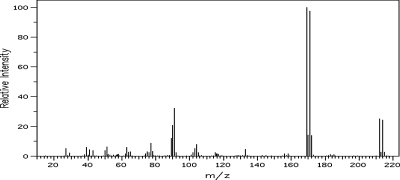


Unlock Deck
Unlock for access to all 60 flashcards in this deck.
Unlock Deck
k this deck
47
For the following molecule,give the splitting patterns for HA and HB. 


Unlock Deck
Unlock for access to all 60 flashcards in this deck.
Unlock Deck
k this deck
48
Sketch a predicted 1H NMR spectrum for the following molecule. 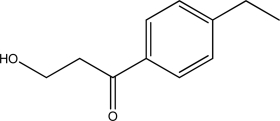


Unlock Deck
Unlock for access to all 60 flashcards in this deck.
Unlock Deck
k this deck
49
Is a chlorine or a bromine present in the molecule responsible for the following mass spectrum? Explain how you know. 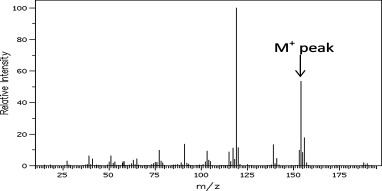


Unlock Deck
Unlock for access to all 60 flashcards in this deck.
Unlock Deck
k this deck
50
The mass spectrum for an unknown molecule has an M+ peak with a relative intensity of 100 and an M + 1 peak with a relative intensity of 5.5.How many carbons are in the unknown molecule?

Unlock Deck
Unlock for access to all 60 flashcards in this deck.
Unlock Deck
k this deck
51
Draw a splitting diagram for HA and indicate the expected splitting pattern. 


Unlock Deck
Unlock for access to all 60 flashcards in this deck.
Unlock Deck
k this deck
52
Explain how coupling constants can be used to determine whether an NMR spectrum represents compound A or compound B. 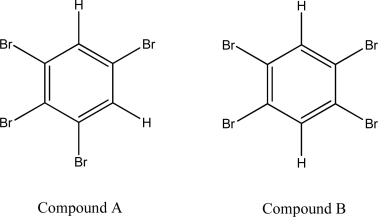


Unlock Deck
Unlock for access to all 60 flashcards in this deck.
Unlock Deck
k this deck
53
Explain how you can use a mass spectrum to determine if a single nitrogen is present in a molecule.

Unlock Deck
Unlock for access to all 60 flashcards in this deck.
Unlock Deck
k this deck
54
For the following molecule,give the splitting patterns for HA,HB,and HC. 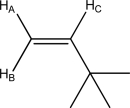


Unlock Deck
Unlock for access to all 60 flashcards in this deck.
Unlock Deck
k this deck
55
Draw a splitting diagram for HA and indicate the expected splitting pattern. 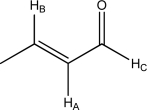


Unlock Deck
Unlock for access to all 60 flashcards in this deck.
Unlock Deck
k this deck
56
How many distinct 13C NMR signals are expected for the following compound? 


Unlock Deck
Unlock for access to all 60 flashcards in this deck.
Unlock Deck
k this deck
57
Sketch a predicted 1H NMR spectrum for the following molecule. 


Unlock Deck
Unlock for access to all 60 flashcards in this deck.
Unlock Deck
k this deck
58
Label the base peak and the M peak in the following mass spectrum. 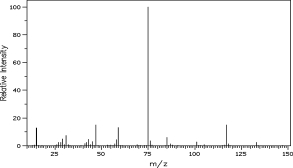


Unlock Deck
Unlock for access to all 60 flashcards in this deck.
Unlock Deck
k this deck
59
Sketch a predicted 1H NMR spectrum for the following molecule. 


Unlock Deck
Unlock for access to all 60 flashcards in this deck.
Unlock Deck
k this deck
60
A molecule has the formula C4H9Cl,and its 1H NMR spectrum has only one singlet at 1.49 ppm.Give the structure of this molecule.

Unlock Deck
Unlock for access to all 60 flashcards in this deck.
Unlock Deck
k this deck


